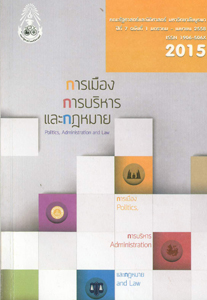ประสิทธิผลของการบริหารคุณภาพในองค์การภาครัฐของไทย
Keywords:
การบริหารคุณภาพ, เกณฑ์คุณภาพการบริหารจัดการภาครัฐ, PMQA, ผลการปฏิบัติราชการ, Quality Management, Public Sector Management Quality AwardAbstract
นับตั้งแต่สำนักงานคณะกรรมการพัฒนาระบบราชการได้ขับเคลื่อนการพัฒนาคุณภาพการบริหารจัดการภาครัฐอย่างจริงจัง โดยให้ทุกส่วนราชการยึดแนวทางการพัฒนาตามเกณฑ์คุณภาพการบริหารจัดการภาครัฐ (Public Sector Management Quality Award: PMQA) และมีการติดตามผลการดำเนินงานอย่างต่อเนื่อง โดยมีเป้าหมายเพื่อให้ส่วนราชการไทยสามารถยกระดับคุณภาพและมีการดำเนินงานที่ได้มาตรฐานสากล อย่างไรก็ดี ในห้วงระยะเวลา 7-8 ปีที่ผ่านมา ระบบราชการไทยยังคงเผชิญกับปัญหาดั้งเดิมที่ท้าทายมาโดยตลอด กล่าวคือ ความไม่เชื่อมั่นของประชาชนที่มีต่อระบบราชการ และคุณภาพในการปฏิบัติราชการที่มีแนวโน้มตกต่ำลง บทความชิ้นนี้เป็นผลการศึกษาข้อมูลทุติยภูมิของส่วนราชการไทยจำนวน 142 กรม ระหว่างปี พ.ศ. 2548-2556 เกี่ยวกับผลการปฏิบัติราชการ และความพึงพอใจของผู้รับบริการ โดยนำมาเชื่อมโยงกับผลการดำเนินงานตามตัวแบบ PMQA และเลือกใช้สถิติทดสอบ การวิเคราะห์ความแปรปรวนแบบวัดซ้ำ (Repeated Measure ANOVA) เพื่อชี้ให้เห็นทิศทางของผลลัพธ์ การดำเนินงานในแต่ละปี ผลการศึกษาพบว่า ส่วนราชการไทยมีแนวโน้มผลการปฏิบัติราชการที่ต่ำลง สวนทางกับความสำเร็จในการยกระดับคุณภาพ และสะท้อนให้เห็นว่าการพัฒนาคุณภาพตามตัวแบบ PMQA ในปัจจุบันเป็นการพัฒนาที่แยกส่วนออกจากการมุ่งสู่ผลสัมฤทธิ์ในการปฏิบัติงานตามภารกิจของรัฐ ข้อเสนอแนะในการศึกษาครั้งนี้จึงเน้นย้ำให้สำนักงาน ก.พ.ร.วิเคราะห์และทบทวนทิศทางการขับเคลื่อนการพัฒนาคุณภาพการบริหารจัดการภาครัฐอย่างจริงจัง เพื่อเสริมพลังให้เครื่องมือดังกล่าวสามารถช่วยยกระดับคุณภาพในทิศทางสอดคล้องกับบริบทของแต่ละส่วนราชการ และสอดรับกับความคาดหวังของประชาชนได้อย่างแท้จริง
Effectiveness of Quality Management in Thai Public Organizations
Since Office of the Public Sector Development Commission (OPDC) seriously drives quality management development in public sector by having all public agencies adopt Public Sector Management Quality Award (PMQA) approach and continuously follow up the result of this implementation and having a goal to raise the quality level in order perform according to the universal standard. However, during these seven to eight years span, Thai bureaucracy still confronts with the same challenging problems which are citizen distrust toward bureaucracy and the quality of service carry out by the government that seems to be lower than before. This article shows the study using secondary data of 142 government department between 2548 to 2556 B.E. regarding public service performance and customer satisfaction by linking the result according to PMQA model and using Repeated Measure ANOVA in order to show the result trend of each year. The study shows that bureaucratic organizations have a tendency to have a lower performance which goes the opposite direction of the success of quality level. This reflects that the current quality development according to PMQA model is the development that totally separated from better result-oriented implementation according to mission. The recommendation from this study shows that Office of the Public Sector Development Commission (OPDC) should analyze and review driving direction of quality management development seriously in order to empower the above mentioned tool to raise the quality in the direction that is in accordance with context of each bureaucratic organizations and truly conforming with citizen expectation.






